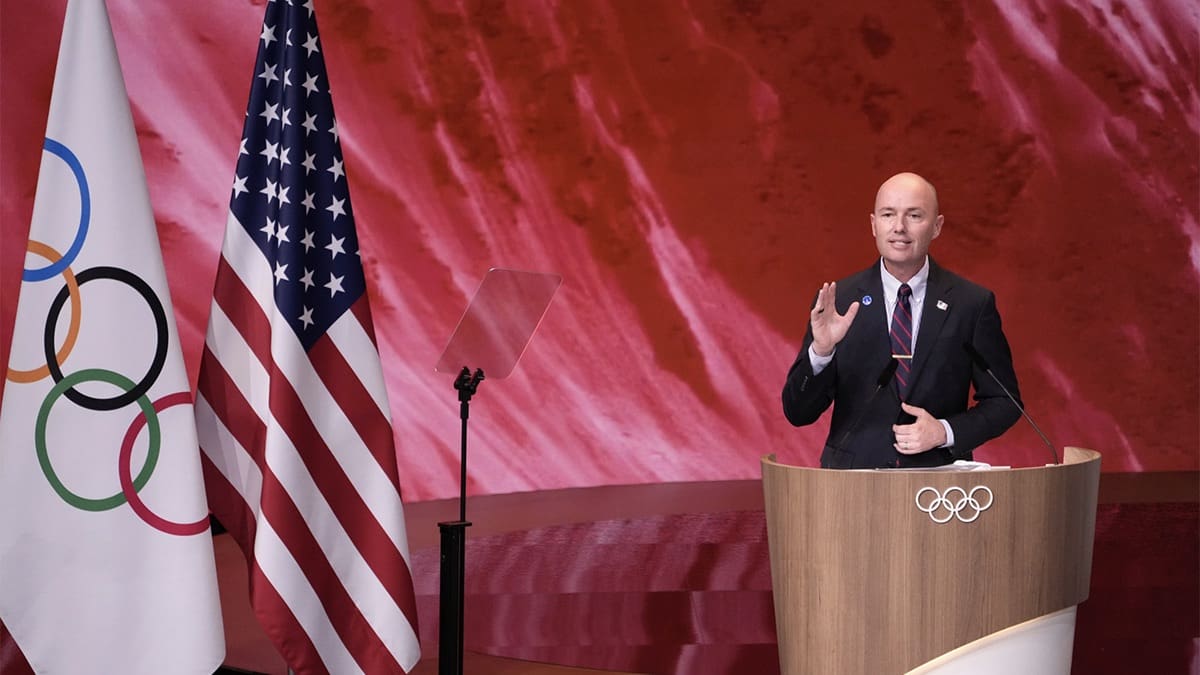Sports
Noodles, wine, the secret ingredients for strange new twist in Olympic doping saga

Utah Gov. Spencer Cox speaks during the final presentation to the IOC on Wednesday July 24, 2024. Photo: AP // David Goldman
PARK CITY, Utah — In the weeks, days and hours leading up to the IOC awarding Utah the 2034 Winter Olympics, an international doping saga threatened to sideline the big bid win. In the center of the scandal were Chinese Summer Olympic Swimmers in the Tokyo 2020 Games. Now, new culinary-focused information is being revealed.
It looked like a recipe for disaster. So, when his country’s swimmers were being accused of doping earlier this year, one Chinese official cooked up something fast. He blamed it on contaminated noodles.
In fact, he argued, it could have been a culinary conspiracy concocted by criminals, whose actions led to the cooking wine used to prepare the noodles being laced with a banned heart drug that found its way into an athlete’s system.
This theory was spelled out to international anti-doping officials during a meeting and, after weeks of wrangling, finally made it into the thousands of pages of data handed over to the lawyer who investigated the case involving 23 Chinese swimmers who had tested positive for that same drug.
The attorney, appointed by the World Anti-Doping Agency, refused to consider that scenario as he sifted through the evidence. In spelling out his reasoning, lawyer Eric Cottier paid heed to the half-baked nature of the theory.
“The Investigator considers this scenario, which he has described in the conditional tense, to be possible, no less, no more,” Cottier wrote.
Even without the contaminated-noodles theory, Cottier found problems with the way WADA and the Chinese handled the case but ultimately determined WADA had acted reasonably in not appealing China’s conclusion that its athletes had been inadvertently contaminated.
Critics of the way the China case was handled can’t help but wonder if a wider exploration of the noodle theory, details of which were discovered by The Associated Press via notes and emails from after the meeting where it was delivered, might have lent a different flavor to Cottier’s conclusions.
“There are more story twists to the ways the Chinese explain the TMZ case than a James Bond movie,” said Rob Koehler, the director general of the advocacy group Global Athlete. “And all of it is complete fiction.”
Something in the kitchen was contaminated
In April, reporting from the New York Times and the German broadcaster ARD revealed that the 23 Chinese swimmers had tested positive for the banned heart medication trimetazidine, also known as TMZ.
China’s anti-doping agency determined the athletes had been contaminated, and so, did not sanction them. WADA accepted that explanation, did not press the case further, and China was never made to deliver a public notice about the “no-fault findings,” as is often seen in similar cases.
The stock explanation for the contamination was that traces of TMZ were found in the kitchen of a hotel where the swimmers were staying. In his 58-page report, Cottier relayed some suspicions about the feasibility of that chain of events — noting that WADA’s chief scientist “saw no other solution than to accept it, even if he continued to have doubts about the reality of contamination as described by the Chinese authorities.”
But without evidence to support pursuing the case, and with the chance of winning an appeal at almost nil, Cottier determined WADA’s “decision not to appeal appears indisputably reasonable.”
But how did the drugs get into the kitchen?
A mystery remained: How did those traces of TMZ get into the kitchen?
Shortly after the doping positives were revealed, the Institute of National Anti-Doping Organizations held a meeting on April 30 where it heard from the leader of China’s agency, Li Zhiquan.
Li’s presentation was mostly filled with the same talking points that have been delivered throughout the saga — that the positive tests resulted from contamination from the kitchen. But he expanded on one way the kitchen might have become contaminated, harkening to another case in China involving a low-level TMZ positive.
A pharmaceutical factory, he explained, had used industrial alcohol in the distillation process for producing TMZ. The industrial alcohol laced with the drug “then entered the market through illegal channels,” he said.
The alcohol “was re-used by the perpetrators to process and produce cooking wine, which is an important seasoning used locally to make beef noodles,” Li said. “The contaminated beef noodles were consumed by that athlete, resulting in an extremely low concentration of TMZ in the positive sample.
“The wrongdoers involved have been brought to justice.”
New information sent to WADA … eventually
This new information raised eyebrows among the anti-doping leaders listening to Li’s report. So much so that over the next month, several emails ensued to make sure the details about the noodles and wine made their way to WADA lawyers, who could then pass it onto Cottier.
Eventually, Li did pass on the information to WADA general counsel Ross Wenzel and, just to be sure, one of the anti-doping leaders forwarded it, as well, according to the emails seen by the AP.
All this came with Li’s request that the noodles story be kept confidential.
Turns out, it made it into Cottier’s report, though he took the information with a grain of salt.
“Indeed, giving it more attention would have required it to be documented, then scientifically verified and validated,” he wrote.
Neither Wenzel nor officials at the Chinese anti-doping agency returned messages from AP asking about the noodles conspiracy and the other athlete who Li suggested had been contaminated by them.
Meanwhile, 11 of the swimmers who originally tested positive competed at the Paris Games earlier this year in a meet held under the cloud of the Chinese doping case.
Though WADA considers the case closed, Koehler and others point to situations like this as one of many reasons that an investigation by someone other than Cottier, who was hired by WADA, is still needed.
“It gives the appearance that people are just making things up as they go along on this, and hoping the story just goes away,” Koehler said. “Which clearly it has not.”


















